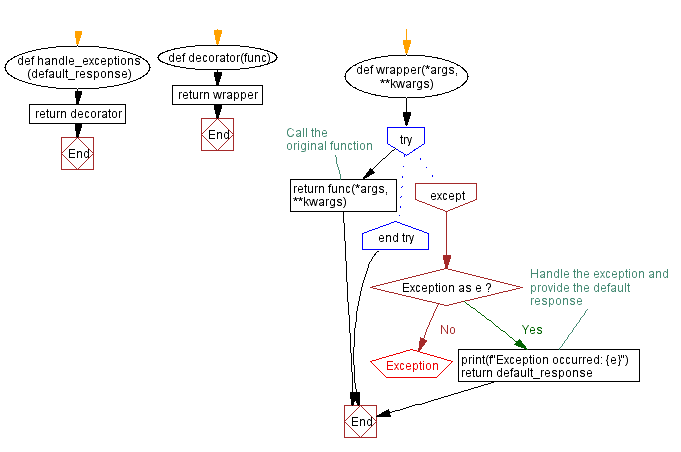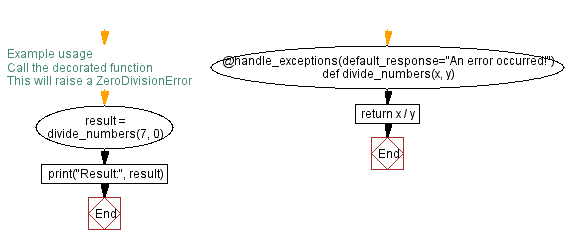Implementing a Python decorator for exception handling with a default response
9. Implement a decorator to handle exceptions with a default value
Write a Python program that implements a decorator to handle exceptions raised by a function and provide a default response.
Sample Solution:
Python Code:
def handle_exceptions(default_response):
def decorator(func):
def wrapper(*args, **kwargs):
try:
# Call the original function
return func(*args, **kwargs)
except Exception as e:
# Handle the exception and provide the default response
print(f"Exception occurred: {e}")
return default_response
return wrapper
return decorator
# Example usage
@handle_exceptions(default_response="An error occurred!")
def divide_numbers(x, y):
return x / y
# Call the decorated function
result = divide_numbers(7, 0) # This will raise a ZeroDivisionError
print("Result:", result)
Sample Output:
Exception occurred: division by zero Result: An error occurred
Explanation:
In the above exercise -
The 'handle_exceptions' decorator takes a default response as an argument. It then defines a decorator function that wraps around the original function. Within the wrapper function, the original function is called within a try-except block. In the case of an exception during the execution of the original function, the default response is returned instead.
In the example usage, the 'divide_numbers' function is decorated with @handle_exceptions(default_response="An error occurred"). When 'divide_numbers' is called with '7' and '0', a 'ZeroDivisionError' will be raised. However, the decorator catches the exception, prints an error message, and returns the default response "An error occurred".
Flowchart:


For more Practice: Solve these Related Problems:
- Write a Python decorator that catches any exception raised by a function and returns a default value instead.
- Write a Python decorator that handles specific exceptions (like KeyError, IndexError) and logs a warning before returning a fallback result.
- Write a Python decorator that retries a function upon catching an exception, and if it still fails, returns a default value.
- Write a Python decorator that wraps a function in a try-except block to handle errors and provides a user-friendly error message if an exception occurs.
Go to:
Previous: Implementing a Python decorator for function logging.
Next: Implementing a Python decorator for enforcing type checking on function arguments.
Python Code Editor :
Have another way to solve this solution? Contribute your code (and comments) through Disqus.
What is the difficulty level of this exercise?
Test your Programming skills with w3resource's quiz.
